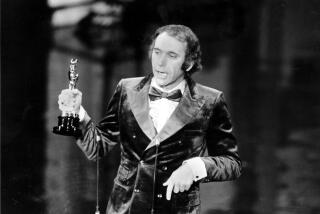A Straight Arrow Gets Thrown a Curve
- Share via
I knew it had gotten serious when I noticed two employees in our firm’s telecopy department staring at me as I filled out a cover sheet. They exchanged conspiratorial whispers: “Is it the same?” “Is it his father?”
They’d seen the movie.
The movie in question is called “Hoodlum.”
Released a few weeks ago by MGM/UA, it features Laurence Fishburne, Andy Garcia and Tim Roth and recounts, at excruciating length, the fight for control of the numbers racket in Harlem in the 1930s. As critics noted, it is a thoroughly mediocre movie--needlessly violent, uneven and occasionally silly. Under ordinary circumstances, Thomas E. L. Dewey is an attorney in New York City. This article was written originally for the Washington Post.
“Hoodlum” probably would not even have rated a rental.
But these were not ordinary circumstances, as I found out the weekend before the movie was released. My mother had read a squib in one of the papers to the effect that “Hoodlum” featured my grandfather, Thomas E. Dewey, the former governor of New York and two-time Republican presidential nominee (yes, he ran against Harry Truman in that famously close race), who began his public career as a crime-busting prosecutor in the 1930s. And, so the paper said, it portrayed him as a crook, regularly taking bribes from Lucky Luciano and other criminals.
*
Shock and consternation. As anyone who knew him will tell you, there was never a straighter guy than Thomas E. Dewey--he and Eliot Ness were probably the only two Americans who actually didn’t drink during Prohibition. The idea that a man like that--a man who had, in fact, convicted Lucky Luciano and many of his colleagues--was on the take was as preposterous as it was offensive.
But--
maybe, we thought, it wasn’t that bad. Perhaps it was just a short scene, easily overlooked or forgotten.
Wrong. From one of the earliest scenes in the movie, where Luciano (Garcia) visits Dutch Schultz (Roth) to collect his portion of the “Dewey payment,” to one of the final scenes, where Dewey (William Atherton) is shown gleefully accepting yet another bribe, the movie completely and mercilessly trashes the man. As the crowd filed out of the theater, I realized we’d been mugged.
What to do? I prevail on my father to view the film (he’s not a regular movie-goer). He sends a letter to MGM Chairman and CEO Frank Mancuso, asking MGM to set the record straight. Mancuso’s lawyers wrote back: “The film was a work of fiction, and it was presented as such to the public. MGM has not violated any legally cognizable rights of either your father or your family.”
*
“Legally cognizable rights” really says it all: We in Hollywood have no responsibilities to society unless and until we might get sued. We can rewrite history at will, knowing that what we’re saying is false and will be believed, so long as we don’t offend anyone’s “legally cognizable rights.”
Back to the telecopy department. I explain to the two employees that the movie’s depiction of my grandfather is false, that he never took a bribe and that he put people like Lucky Luciano in jail when he was a prosecutor in New York City.
They look at me, stunned. “How could they do that then?” asks one.
How indeed.
More to Read
Only good movies
Get the Indie Focus newsletter, Mark Olsen's weekly guide to the world of cinema.
You may occasionally receive promotional content from the Los Angeles Times.








